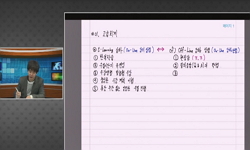Although the merger enforcement of the Korean Fair Trade Commission (“KFTC”) has had a significant impact on the Korean market economy, there have been few legal challenges against the KFTC’s decisions in merger cases. Given that various interes...
http://chineseinput.net/에서 pinyin(병음)방식으로 중국어를 변환할 수 있습니다.
변환된 중국어를 복사하여 사용하시면 됩니다.
- 中文 을 입력하시려면 zhongwen을 입력하시고 space를누르시면됩니다.
- 北京 을 입력하시려면 beijing을 입력하시고 space를 누르시면 됩니다.

공정거래법상 기업결합신고ㆍ승인 및 관련 시정조치의 법적 성격과 기업결합 관련 항고소송의 적법요건에 대한 행정법적 검토 = Analysis on the Legal Nature of Merger Notification, Merger Clearance, and Merger Remedies under the Korean Antitrust Statute and Related Administrative Appeal Litigation
한글로보기https://www.riss.kr/link?id=A108687011
-
저자
이승민 (성균관대학교 법학전문대학원)
- 발행기관
- 학술지명
- 권호사항
-
발행연도
2023
-
작성언어
Korean
-
주제어
기업결합 ; 기업결합신고 ; 기업결합승인 ; 시정조치 ; 항고소송 ; Merger ; Merger notification ; Merger clearance ; Merger remedies ; Appeal litigation
-
등재정보
KCI등재
-
자료형태
학술저널
- 발행기관 URL
-
수록면
1-42(42쪽)
- 제공처
-
0
상세조회 -
0
다운로드
부가정보
다국어 초록 (Multilingual Abstract)
Although the merger enforcement of the Korean Fair Trade Commission (“KFTC”) has had a significant impact on the Korean market economy, there have been few legal challenges against the KFTC’s decisions in merger cases. Given that various interests in the relevant market tend to come into sharp conflict in the event of a merger, it is highly likely that legal disputes will arise in the form of an administrative appeal litigation in the near future. It is at this particular point that legal analysis on the merger from an administrative law perspective is needed.
The Korean antitrust statute, i.e., the Monopoly Regulation and Fair Trade Act(“MRFTA”), requires post-closing notification except for mergers of a certain scale, which are subject to pre-closing notification. When the post-closing notification of a merger meets the statutory requirements, it is effective as is. Therefore, it is self-satisfactory because it does not require the KFTC’s clearance. If the KFTC imposes a remedy targeting the merger, it must be viewed as a separate administrative disposition creating obligations rather than as clearance. The parties, including the counter-party to the notifying party under the MRFTA, may bring an administrative appeal litigation to seek the cancellation of a KFTC remedy.
On the other hand, the pre-closing notification of a merger is an application for the KFTC’s clearance, which is an administrative act. Remedies imposed by the KFTC to mitigate the competition concerns raised by the merger can be viewed as conditions of the KFTC’s clearance. From another perspectives, merger remedies essentially constitute administrative policing, aiming at preventing potential anti-competitive harm. If there is a significant change in circumstances in the future, merger parties must be allowed to request from the KFTC a modification of the remedies, the refusal of which qualifies for administrative appeal litigation.
A third party, e.g., a competitor of the parties to a merger, may file administrative appeal litigation against the KFTC’s merger clearance or remedies. Merger clearance is essentially an administrative permission, the nature of which consists of allowing persons – natural or otherwise - to exercise their fundamental rights, not of granting special or exclusive rights. A competitor may not file a lawsuit to challenge merger clearance merely to erect an entry barrier, but may challenge a merger clearance that will produce significant anti-competitive effects, thereby distorting competition and reinforcing a monopolistic or oligopolistic market structure. In addition, a third party may also exercise the right to request the KFTC to intervene when the initially imposed merger remedies become insufficient because of a significant change in the relevant market.
국문 초록 (Abstract)
공정위의 기업결합심사ㆍ승인은 시장에 많은 영향을 미치고 있지만 아직까지 이에 대한 행정소송은 많지 않았다. 그러나 기업결합이 발생하면 관련 시장의 여러 이해관계가 첨예하게 대립...
공정위의 기업결합심사ㆍ승인은 시장에 많은 영향을 미치고 있지만 아직까지 이에 대한 행정소송은 많지 않았다. 그러나 기업결합이 발생하면 관련 시장의 여러 이해관계가 첨예하게 대립하고 있어, 향후 기업결합 관련 분쟁이 항고소송 형태로 제기될 가능성이 높으므로 행정법적 시각의 논의가 필요하다.
공정거래법상 기업결합신고는 사후신고를 원칙으로 하면서 일정 규모 이상의 기업결합에 대해서만 사전신고 대상으로 삼고 있다. 사후신고는 자기완결적 신고에 해당하므로 이에 대한 접수ㆍ수리나 이후의 기업결합승인은 사실행위에 불과하지만, 그에 대한 접수ㆍ수리 거부는 쟁송법적 처분으로 볼 수 있다. 사후신고 이후 내려지는 시정조치는 금지하명으로서 별도의 독립된 침익적 처분이며, 신고인은 물론 그와 병행적으로 침익적 효과를 받는 신고인 이외의 당사회사도 원고가 되어 그 취소를 구할 수 있다.
사전신고는 행정행위의 신청 또는 수리를 요하는 신고에 해당하므로 이때의 기업결합승인은 행정행위이며, 조건부 승인 취지의 시정조치는 부관(부담)에 해당한다. 또한, 시정조치는 경찰작용의 성격을 지니므로 장래의 중대한 사정변경이 있으면 기업결합 당사회사는 공정위에 시정조치의 변경을 신청할 수 있고, 그 거부에 대해서는 취소소송을 제기할 수 있으며, 자산매각조치처럼 공정위와의 협의를 요하는 경우에는 그 협의가 완료되는 시점에 제소기간이 기산되는 것으로 보아야 할 것이다.
공정위의 기업결합승인에 대해서는 경쟁자인 제3자도 항고소송을 제기할 수 있다. 제3자가 위법한 기업결합 사후신고의 효력을 제거하기 위해서는 사실행위에 불과한 기업결합승인을 쟁송법적 처분으로 보던지, 공정위를 상대로 시정조치 부과를 구하는 행정개입청구권 행사를 인정할 필요가 있다. 반면, 기업결합 사전신고에서의 단순 승인은 행정행위이므로 처분성이 인정되며, 조건부 승인의 경우에는 외형상 별도의 승인처분이 발견되지 않으므로 조건에 해당하는 시정조치의 취소ㆍ무효확인을 구하는 수밖에 없어 보인다. 기업결합승인은 강학상 허가에 해당하지만 경쟁상황을 왜곡하여 독과점적 시장구조를 강화시킬 우려가 있는 경우에는 경쟁자의 원고적격을 인정해야 할 것이고, 이때 제소기간은 행정소송법 제20조에 의하되, 그 기산점은 의결서가 작성되지 않는 단순 승인의 경우에는 보도자료 배포 시점 등을 고려하여, 조건부 승인의 경우에는 의결서 공개 시점을 기준으로 하여, 각 사안별로 판단함이 타당하다. 조건부 승인 이후 중대한 사정변경이 발생한 경우에는 경쟁자인 제3자도 공정위에 시정조치 강화를 요청하는 내용의 행정개입청구권을 행사하고 이를 소구할 수 있다고 보아야 할 것이다.
동일학술지(권/호) 다른 논문
-
‘유체물의 영업비밀성’ 문제의 성격과 실무적 의의 -대법원 2022. 11. 17. 선고 2022다242786 판결을 계기로 삼아-
- 한국법학원
- 류시원
- 2023
- KCI등재
-
주주제안권과 기관간 권한배분 -주주제안권의 범위와 권고적 주주제안권의 도입을 중심으로-
- 한국법학원
- 송지민
- 2023
- KCI등재
-
계약해지 효력정지 가처분의 효력과 발령요건 -대법원 2022. 2. 8.자 2021마6668 결정에 관하여-
- 한국법학원
- 곽희경
- 2023
- KCI등재
-
공익소송에서 소송비용 패소자부담 원칙의 개선에 관한 소고
- 한국법학원
- 김나루
- 2023
- KCI등재




 DBpia
DBpia



